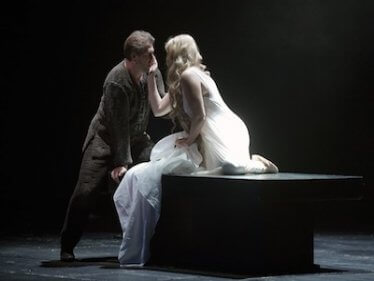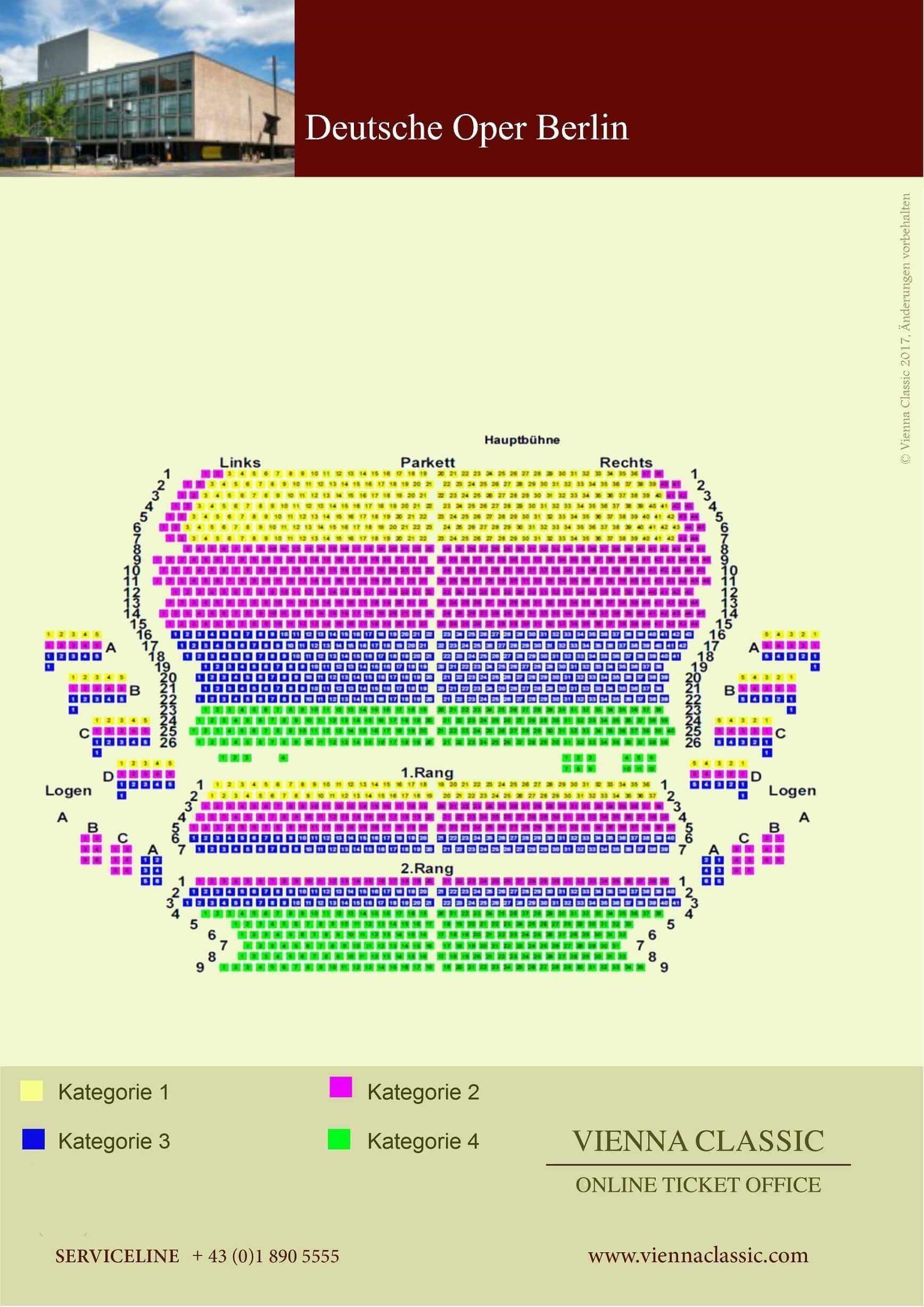Tannhäuser und der Sängerkrieg auf Wartburg - Schedule, Program & Tickets
Tannhäuser und der Sängerkrieg auf Wartburg
Date:
Time:
Location:
20.01.2019 , Sunday
17:00
Deutsche Oper, Bismarckstraße 35, 10627 Berlin, Germany
Dresdner Fassung - Romantic opera in three acts
First performance on 19 October 1845 in Dresden
Premiere at the Deutsche Oper Berlin on November 30, 2008
In German with German and English surtitles
4 hours / two breaks
Tannhäuser longs to return from the realm of Venus to his earthly life. Only with the call of the Virgin Mary does he manage to escape the goddess. Hermann of Thuringia and his chivalrous hunting party welcome the long-lost. The prospect of meeting her beloved Elisabeth moves him home. In a singer's contest at the Wartburg, the essence of love should be explored. The invited singers sing about the purity of feeling, but Tannhäuser extols the passion of Venus. The open confession of pleasure brings society into turmoil; They want to use weapons against Tannhäuser, but Elizabeth, although injured, protects his life. The Landgrave imposes a penalty on Tannhäuser to Rome. The pilgrims, however, return without Tannhäuser; only he alone has not achieved papal forgiveness. He threatens eternal damnation, which he hopes to escape by returning to Venus. The invocation of Elizabeth's name makes him come to his senses again - in the face of her death finds his torn soul now salvation.
The theater as a dream place: Starting from the consideration that Venus and Elisabeth represent only two possibilities that a person is able to unite in itself, Wagner's opera is the starting point for a stage play with the facets and possibilities in the interpersonal coexistence. Not only the medieval moral code, to which the staff of the play is superficially subjugated, is one of the determining levels, but also the changes of the perspective, which are possible through the opposing dispositional expressions in one person. It is no longer the torn-up mind that is at the center of attention, but much more so than the usual temptation: Venus / Elisabeth. TANNHÄUSER from the perspective of a woman who is much more than just a whore or a saint. More than this "either-or" we are interested in tracing the art of love in this work.
"Since Ludwig der Milde, landgrave of Thuringia, had died on a crusade in the East, he left no children, and the land fell to his brother Hermann. At its time, minnesang flourished in German lands, and was practiced and loved by princes and nobles, and Prince Hermann gathered many singers to his shining court on the Wartburg. A time after him, a minnesinger lived in the Franconia, led like most of his singing companions a wandering life. Then, as he passed by the mountain of hearing souls, he had stopped the appearance of a miraculous image of a woman; none other than Madame Venus herself, and beckoned him to follow her into the mountain, and although the faithful Eckart warned him, too, the knight had warned but could not resist, and had gone in, and had let themselves be tricked by Mrs. Venus, and had spent a whole year in the mountains. Many old songs sing and say, how the remorse has come over the Tannhauser, that he has become calm and absorbed in himself, and have again sought out of the mountain. When he expressed this, Madame Venus reminded him of his oath, which he swore to her, but Tannhäuser denied it to her beautiful face. Then she offered to give him another playmate instead of her, but he said that if he did such a thing, he would forever burn in the glow of hell for such polygyny. Then Madame Venus laughed brightly and asked him what he said about hell. Did he ever feel it with her? Whether her red mouth at all hours laughed at him kindly? So the quarrel continued for a while, until Tannhauser, in his ingratitude for all the love and goodness that Frau Venus had done to him, scolded her a devil. At last Ms. Venus resented and threatened to pay him. Then the Tannhauser cried to the Virgin Mary to help him out of the woman, and then Madame Venus spoke with pride: Now he could say he should only take his leave for the old man - he would still praise her praise. Now the Tannhäuser retired from the Venus mountains and turned to Rome to see Pope Urban, who complained and confessed his sins and confessed that he had been with a woman named Venus for a year. The Pope held in his hand the high staff with the Roman double cross and spoke to the repentant singer: As little as the dry staff green here, you, who were at the devil's pit, come to God's pit! In vain he begged Tannhäuser to pay him a year's repentance, then, like that of eternal Rome, he was full of sorrow and distress, and bitterly lamented that the Pope's harsh word had kept him forever from Mary, the heavenly
Huldin, scheide, daß Gott ihn nicht annehme, und verwünschete sich wieder zu Frau Venus in den Hörseelenberg. Die stand schon da und lachte hell und spottete ihm entgegen recht teufelisch: Seid gottwillkommen, Tannhäuser, mein lieber Herr, ich hab Euer recht lang entbehrt, mein auserkorener Buhle!, und lachte noch einmal und riß ihn durch die Höhlenpforte mit sich hinab. Aber am dritten Tage danach, da hub des Papstes Stab an zu grünen, und nun sandte der Papst Boten aus in alle Lande, wo der Tannhäuser hingekommen wäre – der war aber wieder in dem Berg bei seinem schlimmen Lieb …“ (Ludwig Bechstein).
First performance on 19 October 1845 in Dresden
Premiere at the Deutsche Oper Berlin on November 30, 2008
In German with German and English surtitles
4 hours / two breaks
Tannhäuser longs to return from the realm of Venus to his earthly life. Only with the call of the Virgin Mary does he manage to escape the goddess. Hermann of Thuringia and his chivalrous hunting party welcome the long-lost. The prospect of meeting her beloved Elisabeth moves him home. In a singer's contest at the Wartburg, the essence of love should be explored. The invited singers sing about the purity of feeling, but Tannhäuser extols the passion of Venus. The open confession of pleasure brings society into turmoil; They want to use weapons against Tannhäuser, but Elizabeth, although injured, protects his life. The Landgrave imposes a penalty on Tannhäuser to Rome. The pilgrims, however, return without Tannhäuser; only he alone has not achieved papal forgiveness. He threatens eternal damnation, which he hopes to escape by returning to Venus. The invocation of Elizabeth's name makes him come to his senses again - in the face of her death finds his torn soul now salvation.
The theater as a dream place: Starting from the consideration that Venus and Elisabeth represent only two possibilities that a person is able to unite in itself, Wagner's opera is the starting point for a stage play with the facets and possibilities in the interpersonal coexistence. Not only the medieval moral code, to which the staff of the play is superficially subjugated, is one of the determining levels, but also the changes of the perspective, which are possible through the opposing dispositional expressions in one person. It is no longer the torn-up mind that is at the center of attention, but much more so than the usual temptation: Venus / Elisabeth. TANNHÄUSER from the perspective of a woman who is much more than just a whore or a saint. More than this "either-or" we are interested in tracing the art of love in this work.
"Since Ludwig der Milde, landgrave of Thuringia, had died on a crusade in the East, he left no children, and the land fell to his brother Hermann. At its time, minnesang flourished in German lands, and was practiced and loved by princes and nobles, and Prince Hermann gathered many singers to his shining court on the Wartburg. A time after him, a minnesinger lived in the Franconia, led like most of his singing companions a wandering life. Then, as he passed by the mountain of hearing souls, he had stopped the appearance of a miraculous image of a woman; none other than Madame Venus herself, and beckoned him to follow her into the mountain, and although the faithful Eckart warned him, too, the knight had warned but could not resist, and had gone in, and had let themselves be tricked by Mrs. Venus, and had spent a whole year in the mountains. Many old songs sing and say, how the remorse has come over the Tannhauser, that he has become calm and absorbed in himself, and have again sought out of the mountain. When he expressed this, Madame Venus reminded him of his oath, which he swore to her, but Tannhäuser denied it to her beautiful face. Then she offered to give him another playmate instead of her, but he said that if he did such a thing, he would forever burn in the glow of hell for such polygyny. Then Madame Venus laughed brightly and asked him what he said about hell. Did he ever feel it with her? Whether her red mouth at all hours laughed at him kindly? So the quarrel continued for a while, until Tannhauser, in his ingratitude for all the love and goodness that Frau Venus had done to him, scolded her a devil. At last Ms. Venus resented and threatened to pay him. Then the Tannhauser cried to the Virgin Mary to help him out of the woman, and then Madame Venus spoke with pride: Now he could say he should only take his leave for the old man - he would still praise her praise. Now the Tannhäuser retired from the Venus mountains and turned to Rome to see Pope Urban, who complained and confessed his sins and confessed that he had been with a woman named Venus for a year. The Pope held in his hand the high staff with the Roman double cross and spoke to the repentant singer: As little as the dry staff green here, you, who were at the devil's pit, come to God's pit! In vain he begged Tannhäuser to pay him a year's repentance, then, like that of eternal Rome, he was full of sorrow and distress, and bitterly lamented that the Pope's harsh word had kept him forever from Mary, the heavenly
Huldin, scheide, daß Gott ihn nicht annehme, und verwünschete sich wieder zu Frau Venus in den Hörseelenberg. Die stand schon da und lachte hell und spottete ihm entgegen recht teufelisch: Seid gottwillkommen, Tannhäuser, mein lieber Herr, ich hab Euer recht lang entbehrt, mein auserkorener Buhle!, und lachte noch einmal und riß ihn durch die Höhlenpforte mit sich hinab. Aber am dritten Tage danach, da hub des Papstes Stab an zu grünen, und nun sandte der Papst Boten aus in alle Lande, wo der Tannhäuser hingekommen wäre – der war aber wieder in dem Berg bei seinem schlimmen Lieb …“ (Ludwig Bechstein).



